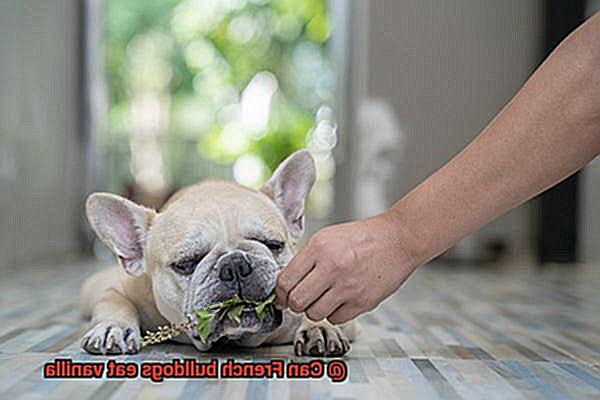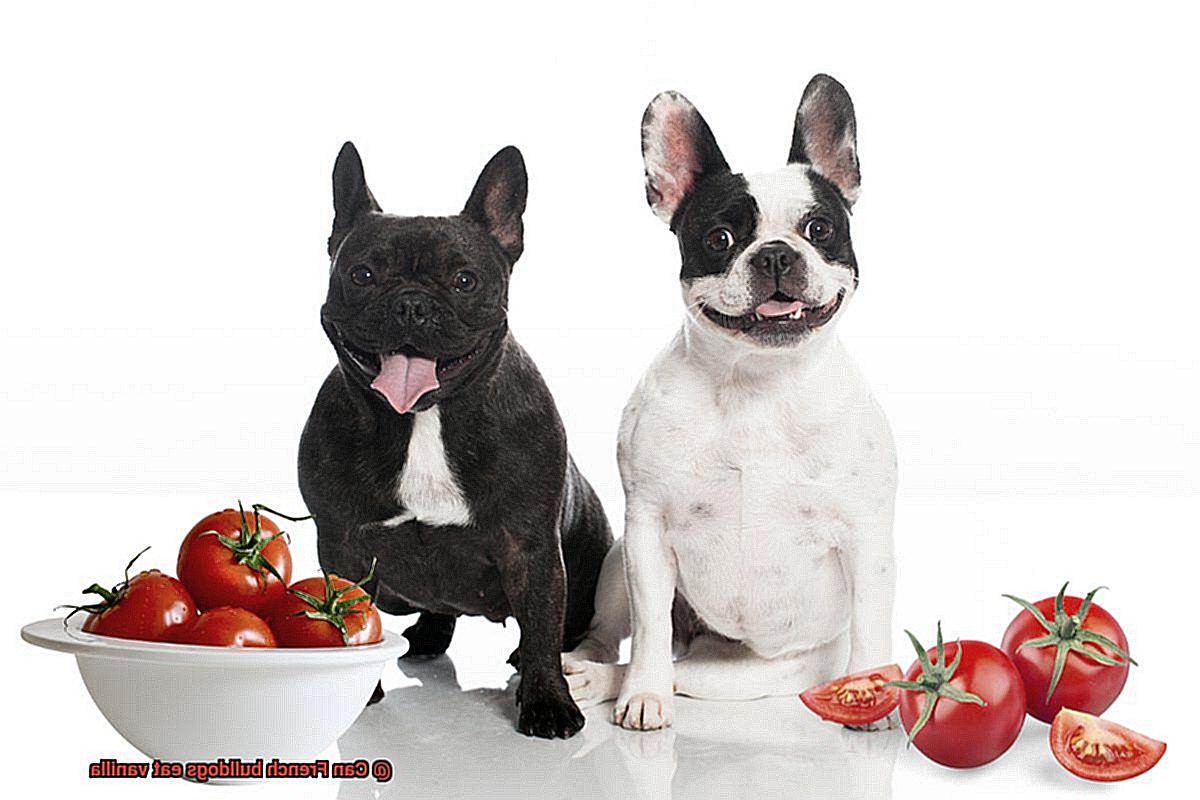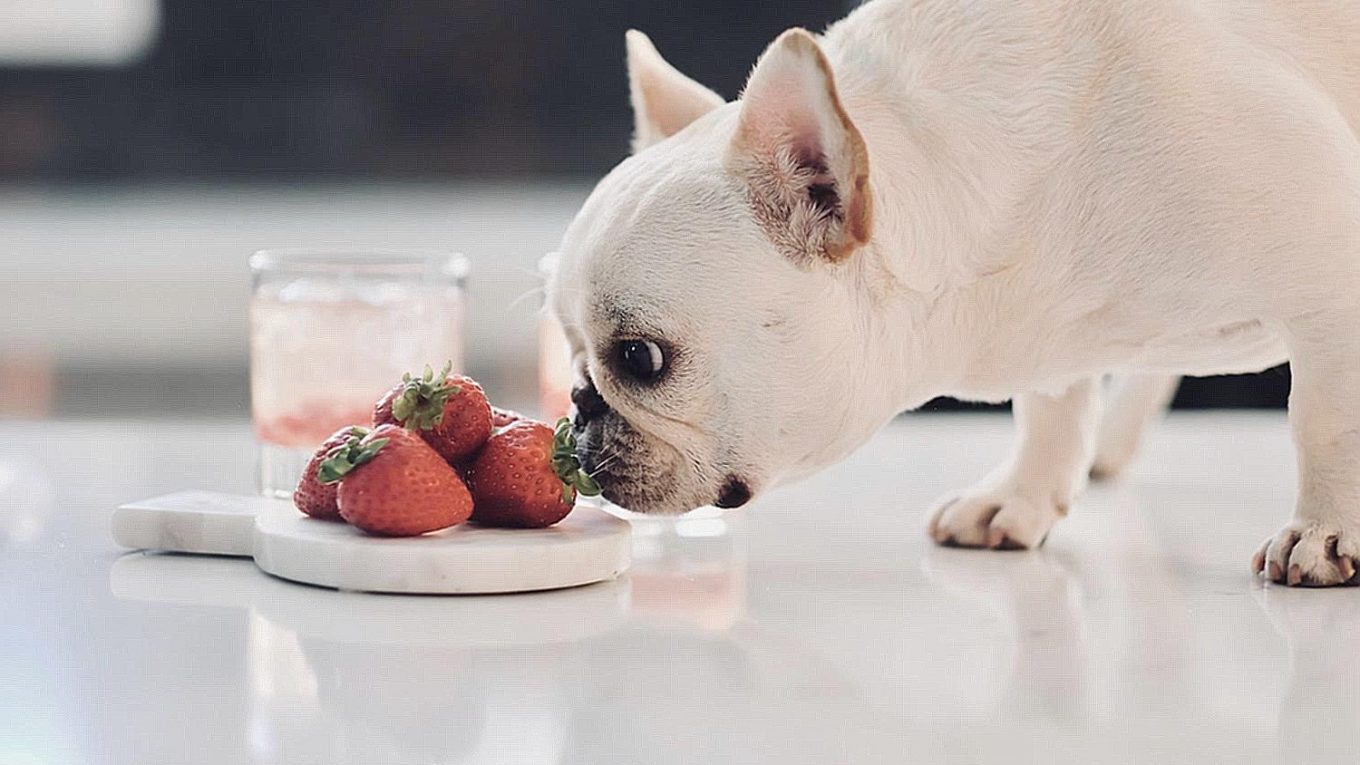Can French bulldogs eat vanilla?
Ever wondered if French bulldogs can get in on the vanilla action? Today, we’re going to dive into the world of vanilla and these adorable, bat-eared pups.
Frenchies, with their unique personalities and picky eating habits, always leave us wondering what treats are safe for them. Vanilla, with its alluring scent and versatility, is a popular ingredient in many tasty delights.
But can our furry friends have a taste? Join me as we uncover whether these little charmers can satisfy their sweet tooth with a scoop of vanilla ice cream or maybe even a hint of vanilla extract in their meals.
Get ready to discover the scrumptious truth.
The Safety of Vanilla for French Bulldogs
Contents
- 1 The Safety of Vanilla for French Bulldogs
- 2 Potential Allergic Reactions in French Bulldogs
- 3 The High Sugar Content in Vanilla-Flavored Products
- 4 Natural and Organic Sources of Vanilla for French Bulldogs
- 5 Introducing New Foods Gradually to French Bulldogs
- 6 Monitoring Your Dog for Adverse Reactions
- 7 Consulting with a Veterinarian Before Feeding Vanilla to Your Dog
- 8 Conclusion
One question that often arises is whether or not it is safe to give our Frenchies vanilla. While vanilla is a popular flavoring agent for humans, it may not be as safe for our furry friends.
The Risks of Vanilla for French Bulldogs
- Alcohol Content: Vanilla extract typically contains alcohol, which can be harmful to dogs if ingested in large quantities. Alcohol can cause symptoms such as vomiting, diarrhea, coordination problems, and even alcohol poisoning in dogs.
- Additives and Sweeteners: Some vanilla products may contain additives or artificial sweeteners like xylitol, which can be toxic to dogs. Xylitol can cause a sudden release of insulin in a dog’s body, leading to low blood sugar levels and potentially life-threatening conditions.
- High Sugar Content: Many vanilla-flavored products have a high sugar content, which can contribute to obesity and other health issues in French Bulldogs.
Better Safe than Sorry
While pure vanilla extract may not pose significant risks to French Bulldogs in small amounts, it is still recommended to avoid giving them any foods or treats containing vanilla. It’s better to err on the side of caution when it comes to the safety of our pets.
What to Do If Your Frenchie Ingests Vanilla
If you suspect that your French Bulldog has ingested a large amount of vanilla or any product containing vanilla extract, contact your veterinarian immediately. They will be able to provide guidance on what steps to take and monitor your dog’s condition.
Potential Allergic Reactions in French Bulldogs
French Bulldogs are adorable and lovable companions, but just like any other breed of dog, they can experience potential allergic reactions. As a proud owner of a French Bulldog myself, I understand the importance of being aware of these allergies and how to keep our furry friends safe and healthy. In this article, I will share my expertise on potential allergic reactions in French Bulldogs and the allergenic components that could be causing them.
Common Allergic Reactions
Allergies in French Bulldogs can present themselves in various ways. Some common signs include skin rashes, itching, ear infections, gastrointestinal issues, and respiratory problems. It’s essential for French Bulldog owners to be vigilant about these symptoms and seek veterinary advice if they suspect an allergy. Our fur babies rely on us to keep them safe and comfortable, so let’s dive into the potential allergenic components that could be causing these reactions.
Vanilla Sensitivity
While vanilla is generally considered safe for dogs in small quantities, some French Bulldogs may have a sensitivity or allergy to this flavoring. The specific allergenic component in vanilla that affects French Bulldogs is not well understood, but it is believed to be related to the chemical compounds present in the flavoring. If your French Bulldog shows signs of an allergic reaction after consuming vanilla or any other food, it’s best to remove the potential allergen from their diet and observe any improvements in their symptoms.
Other Common Food Allergens
Aside from vanilla, there are other common food allergens that French Bulldogs may react to. These include dairy products, grains (such as wheat and corn), soy, beef, chicken, and certain fruits and vegetables. It’s crucial for French Bulldog owners to carefully monitor their pet’s diet and avoid feeding them any known allergens to prevent allergic reactions. If you’re introducing new foods or flavors into your Frenchie’s diet, it’s advisable to do so gradually and monitor for any adverse reactions.
When to Seek Veterinary Advice
If your French Bulldog’s allergic reactions persist or worsen, it’s vital to consult with a veterinarian. They can perform specific tests to determine the cause of the allergy and provide appropriate treatment options. Remember, as responsible pet owners, our furry friends rely on us to keep them healthy and happy, and seeking veterinary advice is essential for their well-being.
In conclusion, French Bulldogs can experience potential allergic reactions, and it’s crucial for us as owners to be knowledgeable about these allergies and take appropriate measures to keep our fur babies safe. By being aware of common allergenic components, such as vanilla and other food allergens, and seeking veterinary advice when needed, we can ensure that our French Bulldogs live their best lives free from discomfort caused by allergies. Let’s protect our furry friends and give them the love they deserve.
The High Sugar Content in Vanilla-Flavored Products

One important aspect of their well-being is their diet. You may be surprised to learn that some vanilla-flavored products, such as ice cream, cookies, and cakes, contain high amounts of sugar. While these treats may be tempting to share with your French Bulldog, it’s essential to understand the potential health risks associated with their consumption.
- Obesity: French Bulldogs are prone to obesity, and feeding them high-sugar foods can contribute to weight gain. Excessive sugar intake can lead to an increase in body fat and put unnecessary strain on their joints and organs.
- Dental problems: Just like humans, dogs can experience dental issues from consuming too much sugar. High-sugar foods can lead to cavities and tooth decay in French Bulldogs, causing pain, discomfort, and even tooth loss.
- Blood sugar spikes: Sugar can cause a spike in a dog’s blood sugar levels, leading to a sudden burst of energy followed by a crash. This rollercoaster effect can negatively impact your French Bulldog’s overall well-being and energy levels.
- Diabetes risk: High sugar consumption can increase the risk of diabetes in dogs, including French Bulldogs. Diabetes is a serious condition that requires careful management and can have long-term health consequences.
Given these potential risks, it’s crucial for French Bulldog owners to be aware of the sugar content in vanilla-flavored products and limit or avoid feeding these treats to their pets. Instead, consider healthier alternatives such as plain yogurt or frozen fruits like blueberries or watermelon.
Remember that when in doubt about whether a particular food is safe for your French Bulldog to consume, it is always best to consult with a veterinarian. They can provide expert advice based on your pet’s specific needs and help you make informed decisions about their diet.

Natural and Organic Sources of Vanilla for French Bulldogs
Vanilla, a classic flavor loved by humans, can also be a delightful addition to your Frenchie’s culinary adventures. In this article, we’ll explore the natural and organic sources of vanilla that are safe for your furry friend to consume.
Pure Vanilla Extract:
Derived from the beans of the vanilla orchid plant, pure vanilla extract is a popular choice for adding flavor to various dishes. It is made by soaking the beans in a mixture of alcohol and water, which extracts the aromatic compounds. When selecting pure vanilla extract for your French Bulldog, ensure it is free from additives, artificial flavors, or sweeteners.
Vanilla Beans:
The aromatic pods that contain vanilla seeds are known as vanilla beans. They offer a rich and intense flavor that can elevate your dog’s treats. Simply scrape out the seeds and add them to homemade dog biscuits or sprinkle a small amount on top of their food for an enticing aroma. Remember to introduce new foods gradually and monitor your Frenchie for any adverse reactions.
Vanilla Powder:
Made by grinding dried vanilla beans into a fine powder, vanilla powder is a convenient alternative to pure vanilla extract. It can be used in baking or sprinkled on top of plain yogurt or homemade frozen treats for an extra hint of flavor. Ensure the vanilla powder you choose is free from any additives or artificial ingredients.
Read Labels Carefully:
When purchasing commercial vanilla products, such as flavored dog treats or ice cream, it’s crucial to read the ingredient list carefully. Avoid products that contain alcohol or artificial flavors, as these can be harmful to your French Bulldog’s health.
Remember:
- Consult with your veterinarian before introducing any new food or flavoring agent into your Frenchie’s diet. They can provide personalized advice based on your pet’s specific needs.
- Moderation is key. While small amounts of natural and organic vanilla are generally safe for French Bulldogs, excessive consumption can lead to digestive issues.
- Keep an eye out for any signs of allergies or sensitivities. Some dogs may have individual reactions to certain ingredients, including vanilla.
Introducing New Foods Gradually to French Bulldogs
French Bulldogs, those adorable little furballs with big personalities, are known for their sensitive tummies. That’s why it’s important to take a slow and steady approach when introducing new foods to their diet. And when it comes to adding a hint of vanilla to their culinary repertoire, there are a few key things to keep in mind.

Start Small: A Ballet of Portion Control
Just like when you introduce any new food to your French Bulldog, it’s best to start with small portions of vanilla. This allows you to observe how your furry friend reacts and ensures they don’t have any adverse effects. So whether you’re adding a dash of pure vanilla extract or a sprinkle of vanilla powder, remember, less is more.
One Step at a Time: A Tango of Patience
When it comes to introducing new foods to your French Bulldog, including vanilla, it’s important to take it one step at a time. Start by introducing one new food and wait for a few days before moving on to the next. This helps you pinpoint any specific food allergies or sensitivities that your Frenchie may have. So grab your dancing shoes and waltz through the world of vanilla, but remember to take it slow and steady.

The Vanilla Vibe: Pure and Natural
When choosing vanilla products for your French Bulldog, opt for the pure and natural kind. Pure vanilla extract is generally considered safe for dogs in small amounts. It adds a sweet aroma and flavor without any harmful additives or sweeteners. So let your Frenchie indulge in the natural goodness of pure vanilla extract, and say au revoir to artificial flavors.
Label Detective: Unmasking Hidden Dangers
Before treating your French Bulldog to the delightful taste of vanilla, make sure you play the role of a vigilant label detective. Check the ingredients list for any potential allergens or harmful substances. Some vanilla products may contain alcohol or xylitol, which can be dangerous for dogs. So read those labels like a pro and keep your furry friend safe.
Consult the Maestro: A Visit to the Vet
When it comes to your French Bulldog’s diet, it’s always best to consult with your veterinarian. They have the expertise to provide personalized advice and guidance based on your dog’s specific needs and health conditions. So before you let your Frenchie taste the sweet symphony of vanilla, schedule a visit to the vet’s office and get their professional opinion.
Moderation is Key: A Rhythm of Balance
While small amounts of pure vanilla extract are generally safe for French Bulldogs, excessive consumption can lead to digestive issues or other health problems. So remember, moderation is key. Let your Frenchie savor the flavor of vanilla in small doses and keep their tummies happy and healthy.
Monitoring Your Dog for Adverse Reactions
While vanilla is generally safe for dogs, it’s crucial to monitor them for any adverse reactions. In this article, we will discuss the importance of monitoring your French bulldog, how to observe for adverse reactions, consider the dosage, and be cautious about the ingredients in vanilla products.
Observing Behavior and Physical Symptoms:
- Watch for signs of discomfort or distress such as excessive scratching or licking, vomiting, or changes in appetite.
- Note any unusual behaviors or physical symptoms after your dog consumes vanilla.
- If you notice any adverse reactions, consult with a veterinarian for guidance.
Dosage Guidelines:
- While small amounts of vanilla are generally safe, excessive consumption can lead to gastrointestinal upset or toxicity.
- Follow recommended dosage guidelines and do not exceed the recommended amount for your French bulldog’s weight and size.
- Start with a small amount and gradually increase if no adverse reactions occur.
Cautious Ingredient Selection:

- Read the ingredients list carefully before offering any vanilla products to your French bulldog.
- Avoid products that contain harmful additives such as artificial sweeteners (e.g., xylitol), which can be toxic to dogs.
- Opt for pure and natural vanilla products without any unnecessary additives.
Consult with Your Veterinarian:
- If you have any concerns or notice adverse reactions, consult with a veterinarian.
- They can provide proper guidance based on your dog’s specific needs and health condition.
- Your vet may recommend alternative flavors or advise against feeding your French bulldog vanilla if they have known allergies or sensitivities.
Consulting with a Veterinarian Before Feeding Vanilla to Your Dog
We all know how irresistible those big, round eyes can be when they’re begging for a taste of what we’re enjoying. And when it comes to vanilla, it’s no different. But before you let your Frenchie dive into the sweet world of vanilla, it’s vital to consult with a veterinarian first. Trust me, it’s like having a lifeguard on duty, ensuring your pup stays safe and happy.
Why ‘Vanilla-ing’ Around with a Vet is Essential
- Expert Guidance: Veterinarians are the real MVPs when it comes to animal nutrition. They have the knowledge and expertise to guide you on what foods are safe for your furry friend.
- Vanilla Variations: Vanilla itself isn’t toxic to dogs, but certain forms, like vanilla extract, may contain alcohol or additives that can be harmful. A vet can help you navigate through the vanilla jungle and ensure you’re using the right kind.
- Frenchie-Specific Sensitivities: Just like humans, Frenchies can have individual sensitivities or allergies to certain ingredients. A vet will help determine if your pup has any dietary restrictions or sensitivities that might make vanilla a no-go.
- Tailored Advice: Vets consider factors like age, weight, pre-existing health conditions, and current diet to determine if introducing vanilla is appropriate for your Frenchie. It’s like getting a personalized meal plan from a celebrity chef.
- Pickiness Problems: Sometimes our furry friends can be picky eaters or lose their appetite due to illness. Vets may recommend using vanilla as a flavor enhancer or appetite stimulant, but they’ll provide the scoop on how much and how often.
- Risk Awareness: Veterinarians can educate you about the potential risks of overindulging in vanilla or any other human food. They’ll help you avoid tummy troubles, obesity, and other health issues that may arise from too much of a good thing.
Vanilla is Great, but Remember the Basics
While a little vanilla can make life sweeter for your Frenchie, it should never replace a balanced and complete diet formulated specifically for dogs. Your vet can help you understand your pup’s nutritional needs and recommend appropriate commercial dog foods or homemade diets.
WYHEgPY4UJo” >
Conclusion
In conclusion, it’s crucial to exercise caution when considering whether French bulldogs can indulge in the tempting scent and taste of vanilla. While vanilla extract is a common ingredient in human food and desserts, it often contains alcohol and additives that can be harmful to our furry friends. These substances can lead to unpleasant symptoms like vomiting, diarrhea, coordination problems, and even alcohol poisoning. Furthermore, some vanilla products pack a sugary punch that can contribute to obesity and other health issues in French bulldogs.
To play it safe, it’s best to steer clear of feeding French bulldogs any foods or treats that contain vanilla. Although small amounts of pure vanilla extract may not pose significant risks, consulting with a veterinarian before introducing any new food or flavoring agent into your Frenchie’s diet is always the wiser choice.
If you suspect that your French bulldog has consumed a large quantity of vanilla or any product containing vanilla extract, don’t hesitate to contact your veterinarian immediately. They possess the expertise needed to provide guidance on the necessary steps to take and closely monitor your dog’s condition.
Remember, the well-being of our beloved furry companions should always take precedence.




